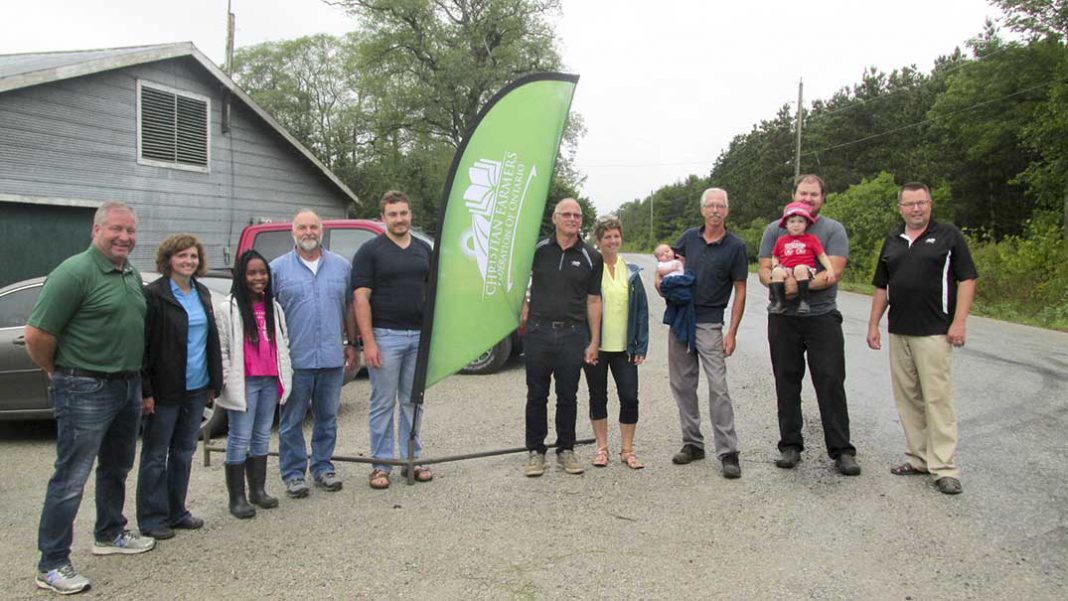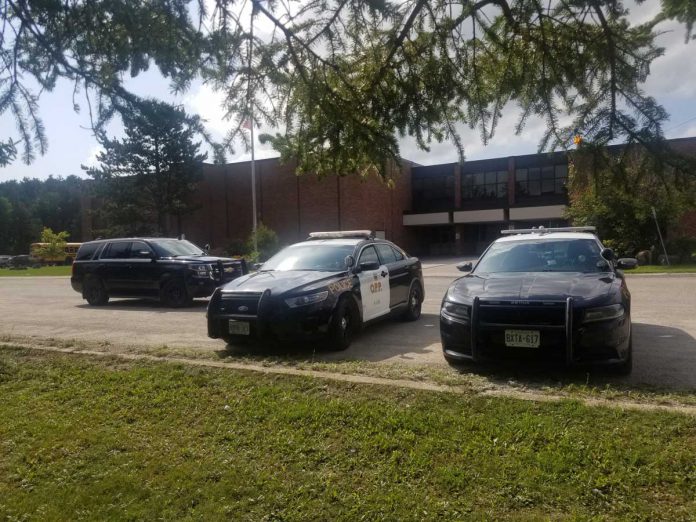ICE LAKE—Members of the Northeastern Ontario District of the Christian Farmers Federation of Ontario (CFFO) made it clear at a picnic held last week at Burt Family Farms in Ice Lake that something needs to be done in terms of predator-damage assistance to farmers whose crops are damaged or destroyed. This comes as the Ontario government has announced some good news for farmers in the form of cutting red tape and helping farmers receive fair compensation for wildlife damage to livestock, something that Green Bay farmers Paul Skippen and Bruce Wood and others have been lobbying for.
“The CFFO worked on that and achieved this along with several other commodity groups,” said Max Burt, of Burt Family Farms in Ice Lake, who said he was happy with the government announcement on Tuesday. “But we still have nothing in place for farm crop damage.”
“This was one of the things we spoke about with CFFO at our event,” said Mr. Burt. “Currently there is a lot of red tape and hurdles that farmers have to go through if they, for instance, lose a calf to a coyote or a wolf. You as a farmer almost have to have a coyote stand in court with the animal in its jaw, and have an evaluator of animals on hand to say it was a livestock kill by a predator.”
“The CFFO is lobbying the province to make some things easier,” Mr. Burt said. “But they are not making much headway with the province in predator damage to crops and assistance being provided for this. There is a simple solution. The MNRF (Ministry of Natural Resources and Forestry) sells deer hunt licences, with the revenues going into their coffers. But it is private landowners—farmers—who are feeding these predator animals that are taking our livestock or destroying our crops. Some of the revenues from deer tags sold should go into a fund that farmers could draw from. I expressed my concerns and my opinion to the CFFO representatives.”
“I hope CFFO and other farm organizations continue to lobby the government for some sort of system being put in place to help assist the farmers,” said Mr. Burt. “Deer and birds do a lot of damage to our crops.”
“It was good that the president of CFFO (Clarence Nywening) and Paul (Bootsma, Field Services Manager with CFFO), had called me and other local farmers about having a meeting on Manitoulin,” said Mr. Burt.
“We talked quite a bit about the wildlife damage compensation program, for farmers to get assistance for predator livestock kills and crop damage,” Mr. Bootsma told The Recorder after the meeting. “We represent farmers from around the province, and we will be taking the concerns raised at the meeting back to the table, follow up and work on all of this.”
“As farmers, one of the issues we have is the ongoing red tape we are faced with,” said Mr. Burt. “I could give you many examples, one is that farmers are required every five years to renew their pesticide licence, which seems to me to be a bit of a money grab,” said Mr. Burt. “How this is applied and used is something that we don’t forget in five years. And we have to take a day-long course at a substantial cost to go through this licencing process every five years.”
“Many farmers suffer hundreds of thousands of dollars in crop losses every year, and there needs to be something in place for farmers in high predator infestation areas. And when it is at an excessive level something needs to be put in place,” said Mr. Burt. “On Pelee Island a pheasant hunt is held every year, and funds for licences so it helps offset land taxes. The licence fees are put back into supporting farmers and land owners who have crops damaged. The precedent is there so there is no reason something similar couldn’t be set up with deer licences on Manitoulin Island.”
“The MNRF sells deer licences for the hunt every year, but we as farmers are basically feeding the deer. Where do the revenues from these licences go? To the MNRF coffers. Some of this should come back to the people who are actually feeding the deer,” said Mr. Burt. “As the CFFO we need to be at the table with OFAH and other agencies making our voices heard and lobbying for support.”
On Monday, the Ministry of Agriculture, Food and Rural Affairs announced that immediate action is being taken to ensure the Ontario Wildlife Damage Compensation Program works as it is intended to support farmers who lose livestock to predators. This is part of the of the government’s mandate to ensure future changes we make are meaningful and effective, said Ernie Hardeman, Minister of Agriculture, Food and Rural Affairs, in a release. “We heard livestock farmers’ concerns with the program so we’re making the first changes effective immediately. We’re also continuing to consult with farmers to ensure future changes we make are meaningful and effective.”
Two changes to the program, which will apply to all claims assessed from September 4, 2018 onwards, are now in effect: The Farm Business Registration Number (FBRN) requirement has been updated to allow applicants to apply for the compensation program if they have a valid FBRN number in the current or the previous calendar year, or have a valid FBRN exemption.
The standardized pricing methodology has been updated to provide separate pricing for steers and heifers.
A number of stakeholder organizations provided feedback during the program review, the release stated. Over the fall, Ontario will seek additional input and advice from the sector on introducing more ways to demonstrate that wildlife predation occurred, ensuring municipal investigators are effectively trained to assess predation, creating a separate appeals process that restores farmers’ confidence in the independence and transparency of the process and refining the standardized pricing model to better reflect market prices.
“This government is committed to making changes that work for farmers, and we will address their concerns so the program works for farmers as intended,” said Minister Hardeman. “This is one step of many to review programs to ensure they work for the people and do not add unnecessary regulatory burdens.”
It is expected that a majority of program changes will be introduced in early 2019.





